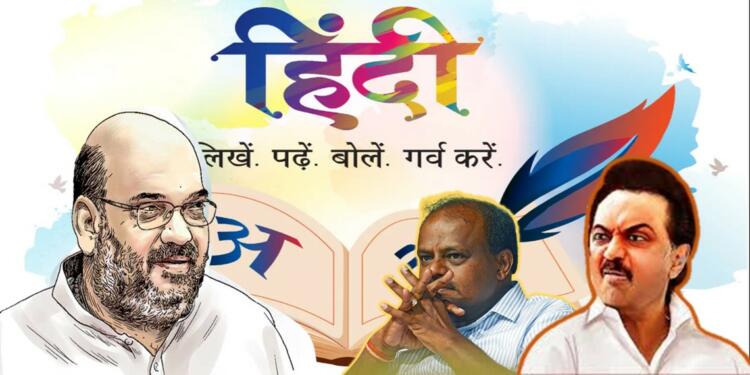The opposition has been waiting for eight years to find common ground against the BJP. Till now, we heard several opposition leaders talk about the need to form a united front against the Modi government.
However, the opposition could never agree on one point. After all, not everyone could oppose moves like abrogating Article 370 and following development-oriented policies. So, the opposition could never really find a common issue to take on the BJP. However, they have now found a common issue- shared opposition to plans for promoting Hindi.
Amit Shah talks about promoting Hindi as an alternative to English
Recently, Union Home Minister Amit Shah said, “PM Modi has decided that the medium of running the government is the Official Language, due to which the importance of Hindi will definitely grow”. He suggested that Hindi should be used as a medium of communication instead of English by people of different language-speaking states.
Read more: Amit Shah aims to implement Article 351
He was very clear that Hindi should be an alternative to English, not our local language. He also highlighted how the government has promoted Hindi and after consultations made Hindi compulsory up to Class 10th in all eight states of the North-East.
However, Shah’s remarks seem to have rubbed the opposition the wrong way.
Opposition leaders oppose the move
Pushing back against Union Home Minister Amit Shah’s suggestion, former Karnataka Chief Minister and senior Congress leader Siddaramaiah tweeted, “As a Kannadiga, I take strong offence to @HMOIndia @AmitShah’s comment on Official language & medium of communication. Hindi is not our National Language & we will never let it be.”
Tamil Nadu Chief Minister MK Stalin too opposed the recent suggestion made by Shah. He tweeted, “The Home Minister says to speak in Hindi instead of English and this is hurting India’s unity. Does the Home Minister only think that Hindi (speaking) states are enough? A single language will not help in unity.”
Similarly, JD(S) leader HD Kumaraswamy too spoke against Shah’s proposal. He said, “Central government and Home Minister are actually trying to forcibly run their personal agendas. But they won’t succeed.” He added that the “people will teach them a lesson”.
Telangana Industries Minister and TRS working president KT Rama Rao tweeted, “Unity in diversity is our strength dear Amit Shah Ji. India is a union of states & a true ‘Vasudhaika Kutumbam’. Why don’t we let people of our great nation decide what to eat, what to wear, who to pray to and what language to speak! Language chauvinism/hegemony will boomerang.”
Why the united opposition on Hindi doesn’t make much sense?
Well, it seems that Union Home Minister Amit Shah’s remarks are being taken out of context. Shah was definitely trying to pitch Hindi as a unifying factor. There is no attempt to wipe out local languages and the main point is to use Hindi as an alternative to English.
In fact, this is in line with India’s Constitution also. Article 343 clearly states that “Hindi in Devanagari script” shall be the official language of the Union. However, the use of English was allowed for official purposes of the Union for fifteen years. The use of English was meant to be a temporary provision for administration convenience. Further, Article 351 enjoins the Union to promote the spread of Hindi.
Whatever Shah said is therefore in line with what the Constitution directs. True, Shah is promoting the Hindi language. But the promotion of the Hindi language doesn’t mean that other languages will be undermined.
Linguistic and regional disputes do have a long history in India and they have also played a role in shaping electoral politics. However, Shah’s recent remarks aren’t something that could reignite the language issue. The opposition is making an issue out of something that doesn’t really concern the voters and its rare unity on an issue against the Modi government is unlikely to yield any major dividends.


























Sorry it’s never the hate for hindi it’s the love for one’s own regional language
I’d like to start things off by stating that I’m a South Indian and I agree more with the policies of the current government than I disagree with them. Additionally, I believe that learning Hindi does have it’s benifits
However, replacement of English as the official language is something that I strongly disagree with. It makes no practical sense in my opinion. The southern states are way richer than their Northern counterparts. If we consider the basic indicators like the per capita income, employment opportunities, literacy rates and medical/educational infrastructure, Tamil Nadu, Karnataka, Telangana, AP and Kerala ( in that order) are vastly superior the BIMARU states where Hindi probably finds most currency.
Consequently the migration of the Indian public is towards the South and West of India and not the north (barring say Delhi). That is the reason cities like Hyderabad, Mumbai and Bangalore are cosmopolitans while Patna and Lucknow are not. It’s more common to spot a Bihari/UP waala in living in Bangalore or Hyderabad than it is to spot a Malayali or a Tamilian in Kanpur.
Consequently, it makes no sense for an average South Indian to go to the North to improve the standard of living as most of the opportunities are either available within their states or in their neighbouring ones. So I don’t see the utility of us learning to converse in Hindi.
I’d rather recommend that people from the north learn the language of the state that they’re migrating to for improving the standard of living rather than have people of the south learn a language that might have limited practical utility to them in their daily lives, which English is.